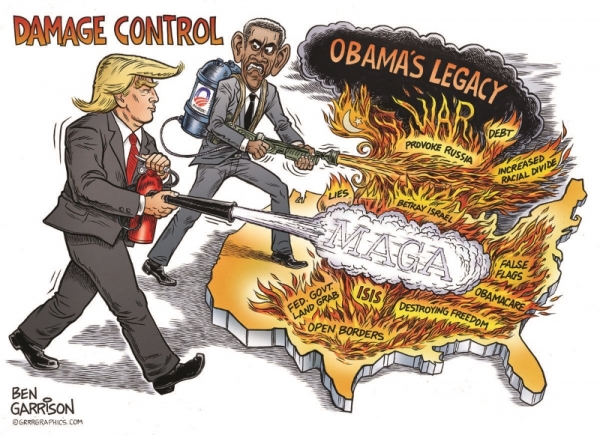워싱턴= 엄청난 무역적자로 허덕이는 미국 경제를 어떻게 할 것인가보다 미국인들을 분열시키는 이슈는 없을 것이다. 트럼프 대통령이 미국 기업들이 불공정하게 당하고 있다고 보는 모든 것을 공격하는 것은 왜 그가 기업들에게 유리한 세금개혁을 하고 민주당이 강력히 반대하는 예산을 의회에서 통과시키려고 애를 쓰고 있는지 설명해주고 있다.
긍정적인 면은 법인세를 대폭 삭감하면서 트럼프는 미국 기업들이 해외에 한 투자를 미국으로 다시 가져올 것으로 기대하고 있다. 애플은 법인세를 35%에서 21%로 줄인 세금개혁 때문에 해외에 투자한 2500억 달러를 미국으로 ‘송환’할 것이라고 약속하며 앞장섰다.
많은 다른 기업도 뒤를 따를 것이 분명한데 그렇게 되면 수십조 달러가 미국으로 들어오고 수천명의 미국인들에게 일자리가 제공될 것이다. 법인세와 고소득층의 세금을 낮추는 트럼프 경제공식인 이른바 트럼프노믹스(Trumponomics)는 중산층과 빈곤층 사람들에게 혜택을 주는 것이 없다고 주장하는 진보와 좌파의 강력한 비판을 가져왔다.
그들은 빈부격차가 더 심해질 것이라고 주장하지만 일반 대중이 트럼프 대선 슬로건인 ‘미국을 다시 위대하게(Make America Great Again)’에 맞게 늘어난 투자로 혜택을 보게 될 것이라는 반박도 있다. 아직은 너무 일러 그 결과를 판단할 수는 없다. 그러나 트럼프는 치솟는 주식시장과 실업률 감소를 보라며 성공했다고 주장하고 있다.

이것이 그의 경제정책과 얼마나 관련이 있는지는 알아봐야 한다. 하지만 분명한 것은 트럼프의 지지도가 지난 1세기 동안 역대 미국 대통령 중 가장 낮은 가운데 있지만 미국 경제는 매우 호황이라는 점이다.
민주당 지지자들과 좌파는 세금 개혁을 비판할 뿐 아니라 이민에서부터 의료보험에 이르기까지 많은 이슈에 화가 나 있다.
미국과 멕시코 사이에 담을 쌓고 미국에 불법으로 들어온 수백만 명을 내쫓겠다는 트럼프의 의지는 논란이 되고 있다. 트럼프는 의회가 건강보험을 갖고 있지 않으면 벌금을 내는 조항을 제거하면서 전임 버락 오바마 대통령의 유산인 건강보험법(오바마케어)을 약화시켰지만 이를 완전히 폐기하지 못한 것에 실망해왔다.
외국기업 입장에서는 대다수 외국 국가가 누리고 있는 미국에 대한 무역흑자를 트럼프 대통령이 공격하는 것이 그의 경제정책 중 가장 눈에 띄는 것이다. 피터슨 연구소 경제학자인 제프리 쇼트는 “적자는 크고 계속 증가할 것”이라며 “그렇게 되면 트럼프 행정부의 보호무역조치도 더 증가할 것”이라고 전망했다.
숫자는 이를 잘 보여준다. 미국이 중국에 보고 있는 무역적자는 8000억 달러에 이르는 미국 전체 무역적자의 절반을 차지하고 있다. 미국은 일본과는 800억 달러, 한국과는 300억 달러 이상의 무역적자를 보고 있다. 무역관계 이외에 북한에 대한 우려를 비롯 한국, 일본과 동맹관계를 맺는 미국이 처한 전략적, 정치적 이슈들이 위급하다는 것이 쇼트의 관측이다.
피터슨 연구소의 게리 허프바우어 선임연구원은 래티스 반도체를 취득하기 위해 13억 달러를 지불하겠다는 중국 벤처자본의 제안을 막은 트럼프의 결정에서 보듯 중국의 대미 투자는 안보상의 이유로 매우 세밀한 조사를 받고 있다고 말했다.
중국이 전 세계 사람들이 무엇이든 뭔가를 찾기 위한 검색하는 구글에 상당한 지분을 확보하게 되면 어떻게 될 것인가? 허프바우어는 “구글은 군사용, 민간용으로 사용될 수 있는 기술을 갖고 있다”며 “중국이 우리를 따라잡지 못하도록 해야 한다”고 말했다.
트럼프는 현행법 하에서 엄격한 심사를 요구하거나 거래를 막을 수 있는 권한을 갖고 있다. 현재 연방의회에 상정된 법안이 채택되면 그는 외국의 투자에 대해서 더 강력한 권한을 갖게 된다. 중국 역시 미국이 중국의 대미투자에 엄격해지면 미국의 대중투자에 대해 더 엄격해질 수 있다.
허프바우어는 “중국의 모든 산업분야는 닫힐 것”이라며 “그들은 더 많은 무역장벽을 세우면서 문을 닫을 것”이라고 말했다. 가장 중요한 제품이 철강이다. 중국 철강은 2007년 세계시장에서 34%를 점유했는데 2016년에는 49%를 점유하고 있다.
브라질, 인도, 한국에서도 생산되는 철강도 증가하고 있다. 국내적으로 반대에도 불구하고 법인세의 대폭감소로 미국 철강 공장들이 다시 살아나고 미국 투자의 유출을 우려하는 외국 교역 상대국들의 아우성이 터져 나온다면 어떻게 될까? 그 반향은 광범위할 것이다.
미국은 한국과 같은 든든한 우방들과의 안보조약을 우려해야 한다. 한국은 미국이 무역적자를 해결하기 위해 단호한 태도를 보이는 것을 강하게 반대하고 있다. 허프바우어는 “우리에게 철강을 수출하는 국가들은 미국의 동맹들”이라며 “미국은 동맹들과 상당한 문제를 갖게 될 것”이라고 분석했다.
세금개혁과 같이 논쟁거리가 되는 법안과 달리 특정한 외국투자들을 막으려는 조치는 공화, 민주당으로부터 초당적인 지지를 받고 있다. 유력한 민주당 상원의원들은 다른 법안에 대해서는 트럼프를 반대하지만 돈을 가져오는 기준을 강화하자는 법안은 지지하고 있다.

미래한국 편집위원
전 뉴욕타임스 특파원
Trumponomics, Luring Dollars to U.S., Upsets Liberals, Foreign Rivals WASHINGTON=Probably no issue divides Americans more than that of what to do about an economy suffering from an enormous trade deficit. President Trump's attack on what he sees as all the inequities facing U.S. business interests explains why he has revamped taxes in favor of corporations and is trying to ram through the U.S. Congress a budget that Democrats are determined to stonewall. The result of the failure to adopt a budget has been to force a "shutdown" of the machinery of government with grave implications for the entire country. On the positive side of the ledger, however, by drastically reducing taxes on corporations, Trump is hoping American business interests will want to move investment from overseas to the United States. Apple has led the way, promising to "repatriate" about $250 billion from overseas, thanks to reforms under which corporate taxes were reduced from 35 percent to 21 percent. Many other companies are sure to follow, bringing multi-billions of dollars back to the U.S. while providing jobs for thousands of American workers. Trumponomics, his economic formula for lowering taxes on corporations, and individuals in upper income brackets, has provoked tremendous criticism from liberals and leftists who claim that middle-class and poor people will not reap the benefits. They argue that the divide between rich and poor will increase, but the counter-argument is that the general public will benefit from greater investment all in keeping with Trump's campaign slogan, "Make America Great Again." It's probably too early to judge the results, but Trump is claiming success as seen in a roaring stock market and a decrease in unemployment. How much those gains had to do with his economic policies is open to question, but it's a fact that the U.S. economy is doing quite well as Trump suffers from the lowest popularity rate of any American president in more than a century. What could be going wrong? Liberals, besides complaining about tax reform, are upset about issues ranging from immigration to medical care. Trump's determination to build a wall blocking the U.S. border with Mexico and to expel millions who have come to the U.S. illegally are among his more controversial goals. Trump has also been frustrated by the failure of the Congress to repeal of the Affordable Care Act, a legacy of his predecessor, Barack Obama, even though Congress did weaken the bill by doing away with penalties on those who have not obtained medical insurance. From the vantage of foreign interests, though, Trump's attack on the trade surplus enjoyed by most foreign countries is probably the most visible aspect of his economic policies. "The deficits are large and continue to increase" said Jeffrey Schott, economist at the Peterson Institute here, predicting "increasingly protective responses" by the Trump administration. The numbers tell the story. China accounts for nearly half the growing U.S. global trade deficit of nearly $800 billion, a figure that compares with the U.S. deficit with Japan last year of more than $80 billion and the deficit with South Korea of more than $30 billion. At stake, beside trade relations, Schott observed, are strategic and political issues involving U.S. treaty alliances with South Korea and Japan and concerns about North Korea. At the same time, said Gary Hufbauer, a senior fellow at the Peterson Institute, Chinese investments in the U.S. "are getting heavy scrutiny due to security concerns" as seen in Trump's decision to block a proposal by China Venture Capital to pay $1.3 billion for the acquisition of Lattice Semiconductors. What, then, if China acquired a huge stake in Google, on which the world depends to look up just about anything and everything? "Google has the technology for military and civilian use" said Hufbauer. "We shouldn't let the Chinese catch up with us." Trump has the authority to demand tight screening, and block transactions, under current law but is likely to get still greater power over foreign investment as a result of a bill now before the U.S. Congress. The Chinese, moreover, are if anything tougher on U.S. investment than are the Americans on Chinese investment in the U.S. "A lot of sectors in China are closed" said Hufbauer. "They're tightening up" he said, citing "overwhelming attempts to put up barriers." One significant product is steel. Chinese steel production has increased from 34 percent of the world market in 2006 to 49 percent in 2016 while steel output has also increased in Brazil, India and South Korea. What if American steel plants roared back to life as a result of the sharp decrease in corporate taxes despite opposition on the home front and outcries from foreign trade partners worried about the outflow of U.S. investment? The repercussions promise to be widespread. The U.S. has to worry about security treaties with staunch friends such as South Korea, which might well object strongly to tough U.S. action on the trade deficit. "Other countries exporting steel to us are U.S. allies" said Hufbauer."You have substantial allied problems." A measure blocking certain foreign investment, unlike contentious legislation such as tax reform, has bipartisan support from Republicans and Democrats. Important Democratic senators support tough standards on taking money even though they oppose Trump on other legislation. The Democrats, said Hufbauer"are just as hawkish as the Republicans." 번역 이상민 미래한국 기자 proactive09@gmail.com
외부게재시 개인은 출처와 링크를 밝혀주시고, 언론사는 전문게재의 경우 본사와 협의 바랍니다.


